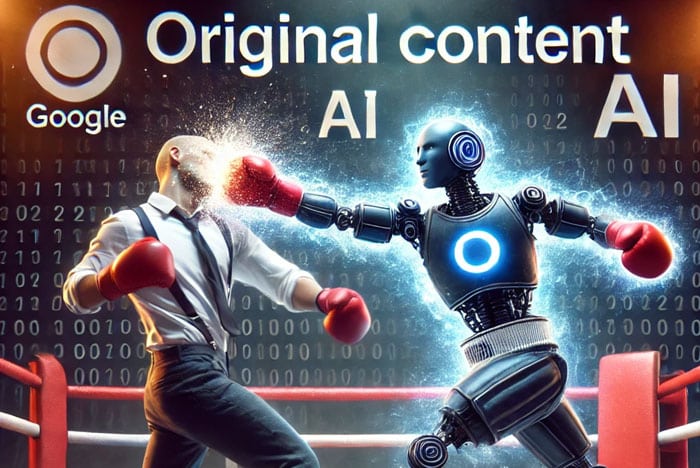Is it a good idea to write your website content with the help of ChatGPT, or are AI generated texts not so good after all? We want to get to the bottom of this question in this article, which incidentally was not written by an AI.
What Google says about AI texts
Let’s first take a look at the official Google guidelines. It says that Google doesn’t really care whether a human, an AI or whatever has written an article as long as it contains added value for its readers. So far so good, you might think, but unfortunately it’s not that simple.
Logically, Google has an interest in ensuring that visitors who come to a website via the search engine are satisfied. Because then there is a high probability that they will continue to trust Google’s search results in the future.
However, I have been a website operator myself for decades, creating new content on a daily basis, and my experience with AI-generated texts and Google search unfortunately does not match up with the Google guidelines.
Experience shows that texts that have been created with the help of AI to a greater extent than 15-20% often receive significantly lower rankings than completely handwritten articles. And this fact naturally raises further questions, because how does a search engine even know whether a text was written by a human or by an AI?
Can AI-generated texts really be recognized as such?

We had ZeroGPT analyze more than 50 texts for this article. And although the results did indeed show a roughly correct tendency, they were also completely off the mark several times. For example, an article that was 100% written by a human was shown to have been over 72% generated by an AI.
On the other hand, a pure ChatGPT article in German was confirmed to be purely human. (The software only worked fairly accurately in English anyway, which must be clearly noted).
And this, of course, poses a considerable problem for webmasters and also for Google itself. The search engine is almost certainly not able to recognize who has written an article and which tools they may have used. This is probably also the reason why the Google guidelines do not go into the issue in any depth. People don’t like to talk about topics for which they don’t yet have any real solutions.
Our conclusion on Google and its handling of AI texts
But what conclusions should you draw from this insight, what is the right way for a webmaster to deal with ChatGPT? Should you keep your hands off it completely, use it only for research, or should you have some text passages written to save yourself a little time and work?
As so often in life, our conclusion is: The Trix is in the Mix (bad English, good motto).
ChatGPT is a great tool to do a good job, but a bad tool to have your job done completely automatically. If you want to write new content, ChatGPT can be a great way to gather information and get inspired. Afterwards, however, you should create an article yourself that is perfectly tailored to your readership and has its own authentic style, which an AI cannot (yet) have. Having the AI proofread the article afterwards and improving some of the wording is a great thing and certainly not detrimental to your Google ranking.
With this in mind, grab your fountain pen or keyboard and write it yourself. Not only does this create the most interesting articles, it also keeps your brain young and fresh.










